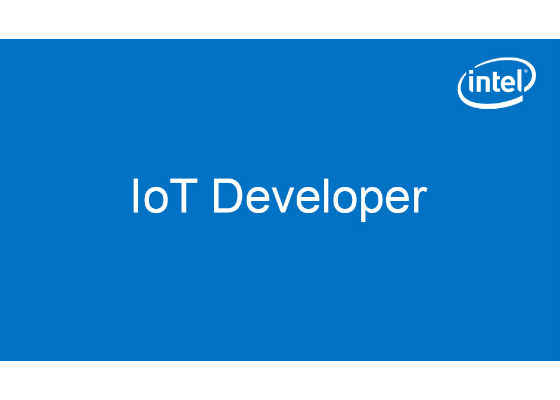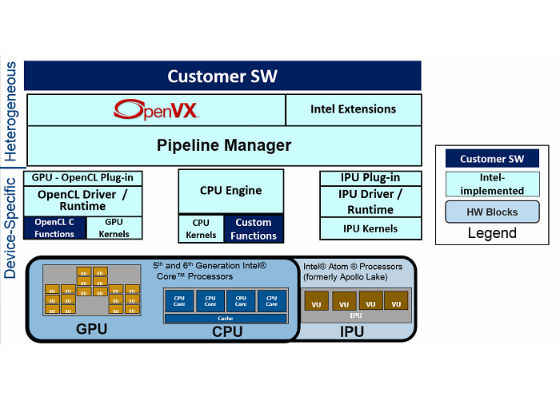Overview of Intel Computer Vision SDK and How it Applies to IoT

What is Intel® Computer Vision SDK?
 Survey
SurveyThe Intel® Computer Vision SDK is an Intel-optimized and accelerated computer vision software development kit based on the OpenVX* standard. The SDK integrates pre-built OpenCV with deep learning support using an included Deep Learning (DL) Deployment toolkit.
About OpenVX* and the Khronos Group*
OpenVX* is an open, royalty-free standard for cross platform acceleration of computer vision applications. The Khronos Group*, an industry consortium, defined OpenVX.
The Khronos Group is a not for profit, member-funded consortium dedicated to the creation of royalty-free open standards for graphics, parallel computing, vision processing. Intel joined the Khronos Group as a Promoter Member in March 2006.
OpenVX* Benefits
The OpenVX* API for computer vision standardizes the application interface for computer vision applications. This enables performance and power-optimized computer vision processing and allows the application layer to transparently use vendor specific hardware optimization and acceleration, when available.
OpenVX* also specifies an API independent standard file format for exchanging deep learning data between training systems and inference engines, called the Neural Network Exchange Format (NNEF*).
Using an extension of OpenVX*, developers can represent Convolutional Neural Network topologies as OpenVX* graphs. This allows developers to mix CNN with traditional vision functions.
Intel® CV SDK Contents
- Intel-optimized implementation of the OpenVX* 1.1 API with custom extensions and kernels.
- Pre-built binaries of OpenCV with Intel® VTune™ Amplifier hooks for profiling.
- Vision Algorithm Designer (VAD), IDE tool
- Deep Learning Model Optimizer tool.
- Deep Learning Inference Engine.
- Sample applications.
Hardware and Software Requirements
Developers can program CV SDK using C/C++ on an Ubuntu* 64-bit development platform using Cmake to manage their builds and using GCC compiler.
The recommended development platform hardware is 6th Generation Intel® Core™ processor or better with integrated Iris ® Pro Graphics or HD Graphics.
Target platforms include: next-generation Intel Atom® processors (formerly known as Apollo Lake), Intel® Core™ processors and Intel® Xeon® processors. The target processors have integrated Iris Pro Graphics or HD Graphics to use OpenCL GPU kernels.
Intel® CV SDK Development Benefits
Intel® Hardware Optimization and Acceleration
Intel® CV SDK which is Intel's OpenVX* implementation, offers CPU kernels which are multi-threaded (with Intel® Threading Building Blocks) and vectorized (with Intel® Integrated Performance Primitives).
This optimized Intel® implementation of OpenCL™ supports Intel® GPUs on integrated Iris Pro or HD Graphics platforms.
Using Intel® CV SDK, developers can access early support for the new dedicated IPU (Image Processing Units) on Next-Generation Intel Atom® processors (formerly Apollo Lake).
These new processors feature an integrated, four- vector image-processing unit capable of supporting advanced vision functions and up to 4 concurrent HD IP cameras.
Custom Intel® Extensions
Intel® CV SDK extends the original OpenVX standard with specific APIs and many Kernel extensions that allow developers to add performance efficient (for example, tiled) versions of their own algorithms to the processing pipelines.
Heterogenous Computing Support
Intel® CV SDK supports both task and data parallelism to maximize the use of all available compute resources including CPU, GPU, and the new dedicated IPU (Image Processing Units).
Profiling Support
Intel® CV SDK has a pre-built OpenCV implementation. This OpenCV implementation integrates hooks for Instrumentation and Tracing technology (ITT) which allows profiling vision applications using Intel® VTune™ Amplifier.
Intel® CV SDK and IoT
One of the most important senses used by humans is our sight and vision. As much as 80% of our interaction with our environment is based on vision.
Until now, IoT relied on multiple sensors to perform basic telemetry and automation tasks because computer vision was expensive, complex, and inaccessible to most developers.
However, with the advent of cheap, HD cameras, processors with built-in CV accelerators and robust computer vision software stacks, there is a rising trend in the use of camera-based computer vision as an IoT sensor for multiple verticals.
Integration with machine learning and deep learning systems opens new application use cases for the use of computer vision in IoT and brings the power of embedded CNN and DNN to the edge.
Related Software:
Intel® VTune™ Amplifier – Advanced Intel toolkit for profiling, visualizing, and tuning multi-processor, multi-threaded or vectorized Intel® platforms which support Instrumentation and Tracing technology (ITT).
Intel® Vision Algorithm Designer – An IDE on top of OpenVX for the development of OpenVX algorithms, workloads, and capabilities in an intuitive and visual manner.
Intel® Deep Learning (DL) Deployment toolkit – A cross-platform DL model optimizer which helps integrate DL inference with application logic.
Intel® Deep Learning Inference Engine – supports inference operations on several popular image classification networks and the deployment of deep learning solutions by delivering a unified API to integrate the inference with application logic.
Intel® SDK for OpenCL™ applications – Accelerated and optimized application performance with Intel® Graphics Technology compute offload and high-performance media pipelines.
For more such intel IoT resources and tools from Intel, please visit the Intel® Developer Zone
Source: https://software.intel.com/en-us/articles/intel-computer-vision-sdk-and-how-it-applies-to-iot
